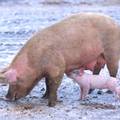 伊利諾大學的新研究顯示,在豬隻生產時慣用的抗生素,有時可能會讓抗藥性基因經由廢水池流進地下水,而造成意料外的後果。
伊利諾大學的新研究顯示,在豬隻生產時慣用的抗生素,有時可能會讓抗藥性基因經由廢水池流進地下水,而造成意料外的後果。
研究結果指出,有些在養豬廢水池的基因會像接力棒一樣被從一種細菌種類轉移至另一種細菌種類。這種透過細菌種類傳遞遷移至新環境的情形,有時候會稀釋或放大基因造成的抗藥性。
在8月份出刊的《應用與環境微生物》期刊(Applied and Environmental Microbiology),有篇新報告追蹤2個伊利諾州養豬場中四環黴素抗藥性基因從養豬廢水池至地下水井的傳遞路徑。
四環黴素被廣泛用於豬隻生產,透過注射進動物體內來治療或是預防疾病,並且常常被拿來當豬隻飼料的添加劑,以促進豬隻生長。
在某些養豬場,這種幾近持續不斷的使用方式,促進了動物消化道及糞堆裡抗四環黴素細菌株的演化。
The routine use of antibiotics in swine production can have unintended consequences, with antibiotic resistance genes sometimes leaking from waste lagoons into groundwater, according to new research from the University of Illinois.
Researchers report that some genes found in hog waste lagoons are transferred, "like batons," from one bacterial species to another. This migration across species and into new environments sometimes dilutes, and sometimes amplifies, genes conferring antibiotic resistance, they say.
The new report, in the August issue of "Applied and Environmental Microbiology," tracks the passage of tetracycline resistance genes from hog waste lagoons into groundwater wells at two Illinois swine facilities.
Tetracycline is widely used in swine production. It is injected into the animals to treat or prevent disease, and is often used as an additive in hog feed to boost the animals' growth.
Its near-continuous use in some hog farms promotes the evolution of tetracycline-resistant strains in the animals' digestive tracts and manure.
全文及圖片詳見 ENS




